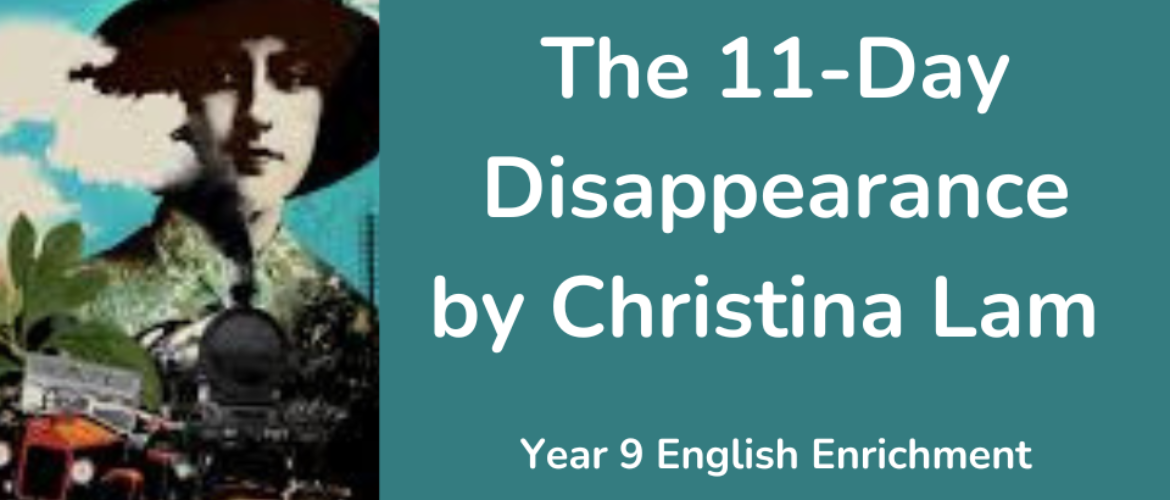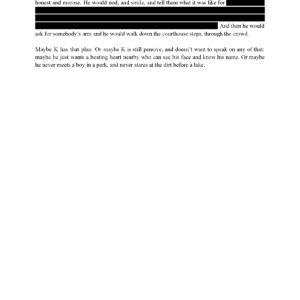Year 9 English Enrichment
Dear Archie,
I hope you are enjoying your time with Miss Nancy Neele, while your daughter sleeps unaware of your infidelity. I write to you burdened by your decision to indulge yourself in this extramarital liaison. How are you not poisoned with guilt that you have frittered away twelve years of faithfulness and betrayed Rosalind’s trust?
I dare you to consider the vows we exchanged on Christmas Eve in 1914. The way you stared into my eyes and proclaimed ‘I do’. I can no longer bear to look at you. A face once so familiar, the Archie I used to know, now so cold and condescending with a permanent caricature of a frown.
‘Till death do us part,’ I presume our parting will occur long before either of us should die.
The wedding ring, like all the promises you made, is worthless. Our relationship is irreparable.
Undoubtedly, this lurid affair with your secretary will be exposed by the newspapers. I hope so. The truth must be revealed. Surely as a colonel you understand the meaning of integrity. Why then did you abandon it and compromise mine?
I grant myself both the space and respect I deserve.
Yours,
Agatha
She quivered as she held her handkerchief in her fist and asked the maid to send it in the morning. As the maid took the letter, she added that she would not return that evening.
The maid nodded once again before resuming her housework. Agatha placed her green velour hat on her head, the curls of her shingled hair now hidden. She tightened the belt of her coat and wrapped herself in her favourite woollen cape. It was winter in the village of Sunningdale in Berkshire, England and in this southeastern region winter was invariably harsh. Agatha gripped her attaché, and kissed her daughter goodnight. It would be eleven days until she would see her again.
All this time, she had been struck with Cupid’s gold tipped arrow, and she had worn rose tinted glasses throughout her time with Archie. She was living in a utopia, a place promised of eternal love and happiness which was torn apart within a single night. When the news of her husband’s infidelity came to light, she felt Cupid’s blunt lead arrow pierce her heart. The poison from the lead had leached into her world, it tainted all the blissful memories of her time with Archie before whisking them into a place far out of her reach. The arrow in her heart instilled a sense of urgency to escape, the urgency would continue to cling to her for the
remainder of the night.
The doors closed behind her. Agatha’s grip loosened around her suitcase as she let out a deep exhalation. She watched as her breath drifted in the cold night like a plume of smoke. How she wished she could move effortlessly like smoke, yet remain alluring but unattainable to those who saw her.
In the forefront of her mind was her daughter Rosalind. She would dearly miss evenings with her daughter; however, she could not bear another moment in a house overflowing with memories, where happiness, sadness and anger were now intertwined.
Agatha’s green Morris Cowley was transformed into a pitch black as it was shrouded by darkness. This was her getaway car, her escape from the havoc which had been imposed upon her. She opened the car door and placed her belongings on the seat beside her. Agatha gripped the steering wheel as she rested her head on the steering wheel.
What do I do now? she asked herself, her eyes clamped shut.
The road was infinite; she could travel to Ascot, Lyne, Windlesham and even Englefield Green, yet she felt restricted. There were only so many places she could hide away before she had to return to her depressing life and confront the issues at hand. Only so many places before she would have to meet and reconcile resolve with Archie, who would merely deflect the situation and treat her as though she was the one who committed an affair. Agatha placed her seat to her side and rested her head on the steering wheel as she cycled through a montage of possible scenarios, all which were against her favour.
Agatha embraced the quietness and tranquillity of the night. She wished she could simply fade along with the darkness and adapt to disruptances with ease. However, the night reminded her of her loneliness, her bleak future of abandonment with Rosalind. Agatha turned the key in the ignition. She yearned to escape the flurry of emotions ricocheting through her mind.
***
A green car overturned on the edge of a chalk pit, what use was it now? Agatha pondered as she stared at the mess she had made once again. Misfortune seemed to have encroached on her since the news of Archie’s affair. It had been looming overhead like a halo, capitalising on her insecurities and waiting for her to make a single mistake. Agatha was taken aback, she could not even drive for a few miles without it being disastrous, how would she continue to live her life in this state of mind? Perhaps she would not have been in total despair if she had chosen not to dance with the devil disguised as Archie, a charming young aviator on their first encounter in 1912. Agatha became colder and made the ultimate decision to abandon the car, she would not waste any more time weighing her limited options.
Agatha pondered what would be open at this ungodly hour. Perhaps an inn or a stay at a motel would suit her for a night or two. No. She decided she deserved a place more luxurious as she battled against her inner demons terrorising her. She would be everything she wasn’t when she was with Archie. She would dance to her heart’s content, be as free as she was in her youth, and live as effervescently as possible – even if only for a few days.
***
Many people believed Agatha’s disappearance was an orchestrated ploy to have Christie’s novels reach new fames. But those people would be unknown to the struggles she had as she waited to be taken from King’s Cross to the Harrogate Hydro. For years, she had believed that love looked like Archie, the loving eyes and the late-night conversations all a facade, crushing what she thought she knew about love. Maybe if she had thought about this an hour earlier, she would be sobbing into her crumpled handkerchief. But at this hour, her tears had run dry, her feelings of sadness swelled into hatred.
The winter light faded as she saw the exterior of the Harrogate Hydro. The beacon of light which would whisk her away from life – temporarily, sadly, not forever. It was not as extravagant as other hotels and spas, but it would suffice, for she was growing weary. Agatha opened the door as she lugged her troubles with her.
“Ma’am, your name, please, for the room.” The man glared at her as Agatha fiddled with the belt on her coat.
She admired the anonymity that hotels and spas allowed, the way you would be able to create a character which represents precisely how you feel. The emotions engulfing her? A sadness fuelled by a sense of inferiority.
“Mrs Neele. Mrs Teresa Neele.” Agatha muttered as she thought in disbelief: Why would I choose that for my alias. Why would I give myself her name?
The young secretary she had often passed whom she never seemed to care to wave ‘Good
morning’, who had been a background actor in her life with Archie until she stole the
limelight.
“First time in Harrogate?” The man bluntly questioned as he scrawled down her ‘name’.
“Yes, I recently came from South Africa.” Agatha blurted, her nervousness now taking full control of her.
“Did you come with no luggage?”
“Yes, I left my luggage with my friends.”
“First floor, down the hallway right on your right, can’t miss it.”
Agatha took the key and made her way towards her room as she was overcome with unease.
***
Mr W. Taylor watched the woman race to her room. As the Harrogate Hydro’s manager, he was able to peer into a moment of someone’s life, . Whether it be the joyful family stay or a night out in the town. But this stay felt eerie. A woman arriving at an unusual hour alone, who had no trouble handing over seven guineas for a room for a week; even a room fitted with hot and cold water and was clearly in a distressed state, despite her efforts to conceal it beneath a mask. I’ll be keeping a close eye on you, Mrs Teresa Neele, he mentally noted as he proceeded to complete his tasks around the establishment.
***
Despite being younger than most of the chambermaids, Rosie Asher was used to the demanding orders from the guests. She had was adjusted to the endless cycles of taking breakfast up to guests each morning before whisking empty plates away, but Mrs Neele captured her attention. It was not common to see someone during their stay borrow numerous books from the library on Parliament Street. Rosie did not have much knowledge of books, but when asking the WH Smith librarian, they had told Rosie that this particular guest had a taste for sensation and mystery, straying far from the popular books of the time. Perchance Mrs Neele would be a character to watch on, for she was much more interesting than the sophisticated ladies who would be ever so demanding in the duration of their stay.
Rosie noticed that her guest seemed to have brought practically nothing with her on her stay. This was evident with Mrs Neele’s extensive shopping spree, continuing long after her time in town, with packages being delivered to her room. The packages which she brought to Mrs Neele ranged from hats, coats and evening shoes to more miscellaneous items such as pencils and fruits. Mrs Neele had justified her spree with the fact that her luggage had been left with ‘friends’. Rosie was taken aback by how she spent money at ease which she had only seen with the baronesses and duchesses who would occasionally stay. Quite evidently to Rosie, Mrs Neele was neither, but she had a similar air of importance.
***
Tonight would be the first night, a new chapter in Agatha’s life. Agatha was unaware that Archie’s presence had waned in her mind, to the extent that he was simply a blurred figure of her past life. She always admired the limitless bounds of experiences which would be able to be contained in a mere page.
How do I introduce myself? Do I insert myself into a conversation? What if they think I am not good enough?
Agatha pondered these questions as she fiddled with the tag on the end of her evening dress. The evening’s events were akin to those to when she had first met Archie, except she was now 14 years older and marred from her past experiences. Instead of a local dance, it would be an evening consisting of a plethora of activities such as billiards and singing. Instead of love she would be looking to reinvent herself, to put fresh ink on a blank page. Perhaps the night would unfold exactly as she wanted to, perhaps it would be a catastrophe, but whatever was to happen, she knew that she had already been through worse experiences.
Agatha sauntered into the dining room, wearing a new evening dress covered by her silver brocade shawl. She had been so fixated on her first impression amongst the guests she had forgotten to remove the price, 75 shillings, pinned to her shawl.
“Is that all you’re worth?” A man howled, his voice capturing the attention of the guests in the dining room.
“I think I am worth more than that.” Agatha bantered as she seamlessly removed the tag in a swift motion.
Her repartee earnt her acknowledgement from fellow guests as many cheered and whistled as she made her way to her seat. Agatha clasped the tag. Others may find it absurd for a grown woman to be transfixed by a mere slip of paper, but to her it was a symbol of her victory, her success at starting anew. Agatha was grateful to be embraced by guests who made the effort to start a conversation with her, thus she was able to gain a few friends.
Laughter floated in the air as the guests moved from different activities at the direction of Miss Corbett, the entertainment hostess of the Harrogate Hydro, or as many of the guests referred to it as, ‘The Hydro’. Agatha was immersed in the relaxed and upbeat atmosphere at the Hydro. She did not have to exist under the guise that she was a brilliant billiard player, when she was oblivious as to how to hold the cue. Nor did she have to sing quietly, she would sing proudly, despite her tune being slightly off.
Under the facade of Mrs Teresa Neele, Agatha was able to exist freely. She boasted to the world her vulnerabilities, and was able to do as she pleased. The highlight of her night was dancing the Charleston. Agatha was aware that she was not the most competent dancer, but she felt as if she were. She had swung her arms frenetically as her feet attempted to keep up with the upbeat jazz tempo. Agatha yearned to live like she danced, to simply be able to change and sway with the always shifting rhythm of life.
When Agatha returned to her room, she was brimming with exhilaration. If asked last week, she would be unable to fathom herself enjoying a delightful evening with a room full of strangers. The ink on the first chapter of her new life was drying, and as she reminisced, she felt bittersweet. She was letting go of her past self, whilst grasping on to the person she wanted to be.
***
Agatha experienced mental distress at the Hydro. Upon reading the headlines regarding Agatha Christie’s disappearance, she would grimace and press her hand to her forehead. To her, there was something familiar about the lady plastered on the front pages of the London newspaper. However, she could not remember, no matter how hard she tried, she was chasing wisps of smoke which would disappear the moment she reached for them. Throughout the nine days Agatha had been at the Hydro, she had been able to eventually ease herself of her spontaneous worries. She continued to indulge in her stay at the Hydro, which like all things in life, would come to an inevitable end.
The eight evenings following her first night at the Hydro were similar. Agatha continued to embrace her newfound confidence and would often fraternise with guests. She had been able to showcase her true personality as she would engage in billiards, singing and dancing. Each morning, Agatha would reflect on the prior night’s events. She felt content as the memories filled her heart, but unbeknown to her, each night could be her last before she had to return to her life.
Two men grew sceptical about Mrs Neele’s true identity. They both worked at the Hydro, and had suspicions that Mrs Neele was in fact Mrs Christie. So, the men approached the Harrogate police station on the 12th of December, a Sunday evening to report their suspicions. This would mark the end of Agatha’s time at the Hydro as, in a mere two days, she would be faced with Archie.
***
Agatha was exhausted from another evening of endless dancing and singing. She cupped her hands around her teacup and embraced the emanating heat as she scanned the London newspaper. The articles for the 14th of December were indecipherable, thus she held the paper closer to her face in an attempt to read the small text. Across from her, Archie Christie sat, waiting for Agatha to notice him. Agatha could feel a stare penetrating through her paper, she lowered the paper and met the man’s glare.
“How long have you been here?”
“Ten, maybe eleven days.” Agatha replied, startled by the question.
“Why didn’t you tell me?”
Agatha failed to recognise her husband, however the commanding and belittling tone felt familiar. Familiar as if it was a voice calling her from a past life, beckoning for her to return. She placed her teacup onto her saucer as she returned the stony stare towards the man across from her.
“And who may you be?”
“It’s me, Archie. This is not like you, it is so out of character for you, why would you
disappear?”
“Archie?”
She remained oblivious to the identity of her husband, her mind was engulfed in confusion.
Who is this man? Why is he oddly familiar? Am I supposed to remember him?
She sipped her tea, trying to shake off the deep uneasiness of this conversation. Perhaps she knew Archie, perhaps she did not. If she had known him, her mind had decided to erase him for a reason. Agatha was certain that he did not know her, maybe on a surface level he had, but that did not matter.
He does not know me, I do not know him and I am positive I am the only one who knows myself.
And she placed her teacup down with a definitive clink.






















































